Many of my strongest memories from books are the meals. Heidi and her fire-melted raclette on toast. Jack Kerouac and his weird obsession with apple pie. Arthur Dent and Co. being formally introduced to their steaks at Milliways. The Last Supper. (Seriously, Matthew? A man’s just told you he’s about to be betrayed and executed, and you want to pay separately because you only had an entree?)
Below are some of my favorite culinary scenes from literature, along with some little-known (read: entirely fictitious) information about how the characters extended their food obsessions once the story had ended….
The Silence of the Lambs by Robert Harris
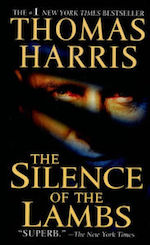 Hannibal Lecter’s anecdote detailing what he did with a hapless census taker—or, specifically, with his liver—made many readers squirm. “A young man once came to my door to sell artisan typewriters,” he might have said if the book was written today. “He had an immaculately groomed beard and spent ten minutes telling me about fair-trade fava beans. So I invited him in. We opened a bottle of Antinori Vinsanto and made a night of it. Who’d judge me?” No one, that’s who. Lecter sees his acts as relative to a great cultural threat. “The exposition of Atrocious Torture Instruments could not fail to appeal to a connoisseur of the worst in mankind. But the essence of the worst, the true asafoetida of the human spirit, is not found in the Iron Maiden or the whetted edge; Elemental Ugliness is found in the faces of the crowd.”
Hannibal Lecter’s anecdote detailing what he did with a hapless census taker—or, specifically, with his liver—made many readers squirm. “A young man once came to my door to sell artisan typewriters,” he might have said if the book was written today. “He had an immaculately groomed beard and spent ten minutes telling me about fair-trade fava beans. So I invited him in. We opened a bottle of Antinori Vinsanto and made a night of it. Who’d judge me?” No one, that’s who. Lecter sees his acts as relative to a great cultural threat. “The exposition of Atrocious Torture Instruments could not fail to appeal to a connoisseur of the worst in mankind. But the essence of the worst, the true asafoetida of the human spirit, is not found in the Iron Maiden or the whetted edge; Elemental Ugliness is found in the faces of the crowd.”
Post-script: After escaping incarceration, Doctor Lecter fled to Italy where he opened a small trattoria called Quid Pro Quo. The food is good, though the reviews on Trip Advisor are suspiciously high.
Alice’s Adventures in Wonderland by Lewis Carroll
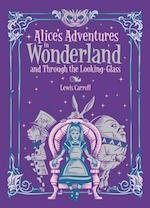 This book has plenty of eating and drinking. In chapter seven, Alice rolls blindly into the tea party convened by a talking hare and a mentally ill milliner. Thanks to science, we now know that many hatters from Edwardian and Victorian England suffered from chronic mercury poisoning. But our Mad Hatter also presents a manic state only slightly less concerning than the dissociative personality disorder shared by Tweedle Dee and Tweedle Dum. You’d probably go mad too if you found yourself in a temporal envelope fixed at 6 o’clock, forcing you to exist in a state of perpetual teatime.
This book has plenty of eating and drinking. In chapter seven, Alice rolls blindly into the tea party convened by a talking hare and a mentally ill milliner. Thanks to science, we now know that many hatters from Edwardian and Victorian England suffered from chronic mercury poisoning. But our Mad Hatter also presents a manic state only slightly less concerning than the dissociative personality disorder shared by Tweedle Dee and Tweedle Dum. You’d probably go mad too if you found yourself in a temporal envelope fixed at 6 o’clock, forcing you to exist in a state of perpetual teatime.
Post-script: In her twenties, still disturbed by persistent visions of her nightmarish experience, and finding therapy ineffective, Alice moved to New York’s Greenwich Village where she and her boyfriend opened Mad Hatters Psychedelic Lounge and Diner. It was raided by police after a cook laced the soup-de-jour with psilocybin. Live and learn.
The Red Wedding in A Storm of Swords by George R. R. Martin
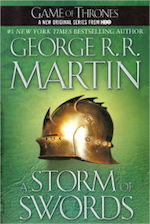 Something to consider when planning a large-scale catered event for friends and family, many of whom have “beef”: at the very least things will get weird. At worst, people will actually get hurt. The wedding feast for Edmure and Roslin raised many issues for the region’s ruling families—not least a revival of the long-standing debate over Westeros’s open-carry laws for swords and daggers.
Something to consider when planning a large-scale catered event for friends and family, many of whom have “beef”: at the very least things will get weird. At worst, people will actually get hurt. The wedding feast for Edmure and Roslin raised many issues for the region’s ruling families—not least a revival of the long-standing debate over Westeros’s open-carry laws for swords and daggers.
Post-script: The saddest part is that the night before the wedding Robb Stark sent a drunken raven to his bastard brother on the Wall. “Bro, f**k all this politics. Jeyne and me have some money saved. We’re gonna run away to Braavos and open a hardcore bar. We’re calling it Dragonz. U in?”
The Metamorphosis by Franz Kafka
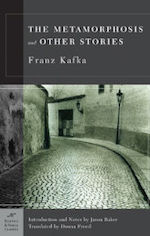 “One morning Gregor Samsa woke from troubled dreams to find himself transformed in his bed into a horrible bug.” The next line could easily have been, “Breakfast was a little tense.” In The Metamorphosis, Samsa’s big problem is hunger. His mother brings him a range of foods. “There were old, half-rotten vegetables; bones from the evening meal, covered in white sauce that had gone hard; a few raisins and almonds.” The story is punctuated by meals. Samsa is brought food twice a day, and at mealtimes he hears his family discussing what to do with him. His father has a minor “freak-out” and bombards him with apples, one of which becomes embedded in his shell. Samsa eventually dies from their neglect. This story conveys to us an important philosophical truth: that insects are gross.
“One morning Gregor Samsa woke from troubled dreams to find himself transformed in his bed into a horrible bug.” The next line could easily have been, “Breakfast was a little tense.” In The Metamorphosis, Samsa’s big problem is hunger. His mother brings him a range of foods. “There were old, half-rotten vegetables; bones from the evening meal, covered in white sauce that had gone hard; a few raisins and almonds.” The story is punctuated by meals. Samsa is brought food twice a day, and at mealtimes he hears his family discussing what to do with him. His father has a minor “freak-out” and bombards him with apples, one of which becomes embedded in his shell. Samsa eventually dies from their neglect. This story conveys to us an important philosophical truth: that insects are gross.
Post-script: In an alternate draft, Samsa discovers he can secrete a tasty, protein-rich “caviar” from sacks in his abdomen. His father makes the family rich by selling these secretions to fancy restaurants. This “white caviar” becomes hugely popular with wealthy diners. The ruse continues for months until Samsa, drunk, and with an upper thorax adorned in gold chains, bursts into the Savoy, shouting: “Gentlemen! Ladies! You are all eating my sack-yolk! Who’s a ‘gross-wad’ now!?”
American Psycho by Bret Easton Ellis
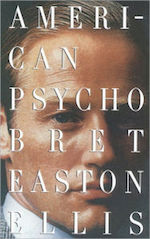 What’s more inhuman: inviting a colleague to your apartment and murdering him with combination of Phil Collins and a chainsaw? Or taking your fiancée to a fancy restaurant and dumping her over dessert? It’s the latter, right? … Well, we’ll just have to agree to disagree. But let me submit: Paul Owen’s agony was brief; poor Evelyn’s public humiliation is a wound she’ll have to endure for the rest of her life. The art here is emotional distance. Patrick Bateman is able to insulate himself from his barbaric acts—much as we do when we buy an electronic device manufactured under sub-human conditions or convince ourselves that what we’re enjoying is high cuisine, not simply the mutilated carcass of an animal. This is what it means to be a modern consumer. “Though it does sporadically penetrate how unacceptable some of what I’m doing actually is, I just remind myself that this thing, this girl, this meat, is nothing.”
What’s more inhuman: inviting a colleague to your apartment and murdering him with combination of Phil Collins and a chainsaw? Or taking your fiancée to a fancy restaurant and dumping her over dessert? It’s the latter, right? … Well, we’ll just have to agree to disagree. But let me submit: Paul Owen’s agony was brief; poor Evelyn’s public humiliation is a wound she’ll have to endure for the rest of her life. The art here is emotional distance. Patrick Bateman is able to insulate himself from his barbaric acts—much as we do when we buy an electronic device manufactured under sub-human conditions or convince ourselves that what we’re enjoying is high cuisine, not simply the mutilated carcass of an animal. This is what it means to be a modern consumer. “Though it does sporadically penetrate how unacceptable some of what I’m doing actually is, I just remind myself that this thing, this girl, this meat, is nothing.”
Post-script: Bateman took indefinite leave after his alleged murder spree—a crime for which his employer gave him a verbal warning and docked half his bonus. He lost a large chunk of his savings investing in a five star bespoke burger joint called Burgers & Executions.
Top image: Hannibal (NBC, 2014)
 M. Suddain’s book Hunters & Collectors was published in July by Jonathan Cape.
M. Suddain’s book Hunters & Collectors was published in July by Jonathan Cape.










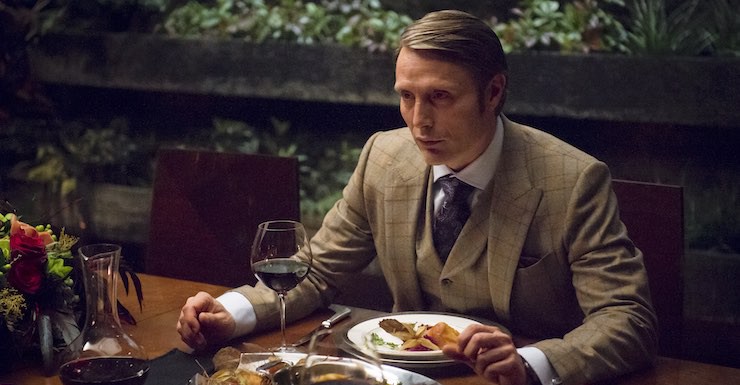
Steven Brust, Dzur. Half the book consists of a lengthy description of a meal at Valabar’s, quite simply the greatest restaurant in the setting. And boy do you feel hungry while reading it.
Oh my goodness don’t forget the wonderfully evocative meals described and eaten in Patrick O’Brien’s Aubrey and Maturin series!
+15 for Dzur and +1 for the O’Brien.
I’ll add the disastrous Miles Vorkosigan dinner party in A Civil Campaign. Epic.
This list is not at all what I was expecting, hahaha.
I really loved reading about Harry’s first feast at Hogwarts. Partially because all the food sounded so yummy, and because symbolically what it represents for him, as he’s basically be half starved by his caretakers and forced to eat whatever he could scrounge after Dudley had his share.
Jack Vance’s description of “fine Darsh cuisine” in _The Face_ (Demon Princes 4).
Certainly memorable.
At the risk of being one-note Johnnie, I will put forward the picnic at the end of “The Unpleasant Profession of Jonathan Hoag”.
The book Magic Banquet by A.E. Marling revolves around a (you guessed it) banquet of magic delights. The descriptions are amazing and the book is really good.
Edit:
How could I forget any thing in the Sin du Jour series? The whole thing is about a catering company.
The Hogwarts meals in the Potter books, yes! I’d like that treacle tart recipe . . . it sounds like it might turn out like Karo Pie, which is made with corn syrup and eggs, rather than molasses or ribbon cane syrup.
Mushrooms! in LOTR.
A depends-on-if-you-like-it-cooked-this-way dish: “a nice smooth bowl of gruel, thin but not too thin” in Jane Austen’s Emma.
Seemingly every other chapter of every single Redwall book involves a meal!
Maybe not an exact fit, but I loved Dissertation Upon Roast Pig by Charles Lamb.
@@@@@ 3: Well, the food wasn’t memorable, so much as what it was made of and the company that showed up for that dinner party… but I think it’s actually the funniest thing in the whole series, hands down, right down to Aral showing up wearing the next best thing to a Hawaiian shirt and wondering what the hell his son has been up to… (And how much better he takes the butter bug infestation than Miles does. Of course, by that point in his life, if the invasion isn’t human or some wacky Sergyaran wildlife, he’s probably hard-pressed to care.)
@@@@@ 9: I somehow got the impression that Jaques was routinely sitting there filling in chapters of Abby goings-on when he’d rather be at dinner. Not sure how. ;)
The Thief, by Megan Whalen Turner, has a scene where grumpy thief Gen, after months of prison food, gets his first nice meal and day out of doors… and promply overdoes it and has to be hauled back onto his horse. (Actually, a good first quarter of the book has him spending 90% of his physical and mental energy attempting to get to every single piece of food he sees, reserving the other 10% for annoying his companions.)
The Red Wedding is memorable indeed, though I obviously prefer the Pink one, if not its immediate sftermath.
Drowned Wednesday by Garth Nix. Changed my life so much.
Farmer Boy by (ostensibly) Laura Ingalls Wilder. Starting with that first dinner.
@9: Yes! That series is one long string of great meals with interludes of battle, riddle-solving, and great landscapes.
Poppy Z. Brite/Billy Martin’s Liquorverse books are so great–restaurant procedurals, someone I can’t think of (I don’t think I thought of it myself) called them–but I’m having a hard time recalling any particularly memorable meals in them.
The fish dinner in Memison featured in Eddison’s, um, A Fish Dinner in Memison.